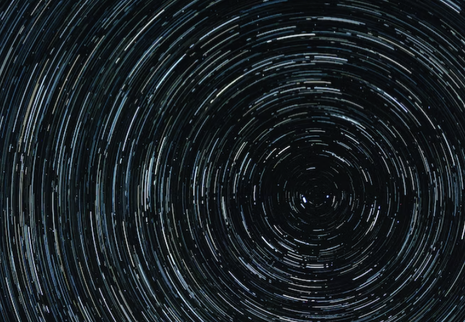Poems and staircases: the baffling world of spirals
Anna Wythe looks at the strange forms that poetry can take, looking at how spiral structures can provide a new way of considering the way we read.

I have become fixated on the black-and-white opening of The Wizard of Oz. For me, the story could have been simply that of the tornado and Dorothy whirling within it. Grey winds circle the windows of her airborne house. They bring a cyclist, a grandmother knitting, a flash of witchcraft. I want to see only that dark spinning before the new world opens up, in garish technicolour vistas.
We are used to the idea of literature as a secret door, a transportation to the magical and strange. But what of the brief dislocation, the poem that returns you to a world suddenly out-of-joint? What if Dorothy had found herself blinking and bewildered in an alien Kansas?
“We are used to the idea of literature as a secret door, a transportation to the magical and strange”
Back in February, I braved the bleak courts of Trinity College to attend a recital by the poet A. E. Stallings. Hearing her work read aloud, I felt the compulsive logic of poetic form. Stallings read us sonnets, sestinas, villanelles and odes, our minds climbing through the structures like wisteria up a trestle. Being unfamiliar with her poems, I had to follow blindingly, treading hesitantly until I tripped over the ending and was released. I thought of the monster Geryon, a beast who swims through the air of hell in a circling flight and bears Dante deeper into its depths.
With Stallings, we journeyed to the classical underworld, but her poems offer no escape from either the present or the self. The proximity of the dead to the living is palpable as Persephone clutches down flowers by their roots. “At times I feel the trees, rocking in place / Like grief, clenching the dirt with tortuous toes,” she writes in a letter to her mother Demeter. Yet Stallings brings us sharply back to the solitary act of writing as we realise the letter will never be read, that it is decaying in Persephone’s very hands.
“At the still point of the turning world.” I am always lost for a moment as I climb a spiral staircase. Of course, it’s possible that my alveoli can’t cope with even the mildest exertion and it is the resulting lack of oxygen that grants me this slightly mystical experience. The romantic in me, however, would like to believe that its source lies in the structure itself. Spiral staircases are the magical creatures of architecture. As you follow them, you feel both drawn into the centre and spun out to the peripheries. For a moment, you are not going from one place to another; you are simply turning.
“The world after a poem is like the world after a storm”
The world after a poem is like the world after a storm. The colours seem particularly sharp. It is as though everything has come apart and been put back together again, only a little different.
If I were a lifestyle guru, I would now be urging you to incorporate a splash of grace into your daily routine to ensure a roseate complexion. As a guru of nothing, I can only say that the wonder of poems and spiral staircases is that the time you spend in their coils is a fissure in routine, a disruption after which you cannot simply return to the task at hand. The formal completeness of Stallings’ work belies the enduring paradox and irresolution of the ideas at stake.
I have latched onto the word ‘breathturn’ to describe this sense of dislocation. I have stolen it from Paul Celan, and probably also from its intended meaning. Celan himself is a master of dislocation, of taking words out of your mouth and making them taste of blood and stones. His poems are thin, their lines sometimes only a single word long. “Eternities, died / over and above you, / a letter touches / your still un- / wounded fingers.” They unravel in you painstakingly, painfully.
The poems of Stallings and Celan speak in alternative logic. For Stallings, rhyme and repetition give her poems the ‘rightness’ of a syllogism. The reader realises that words relate to each other in strange and various ways, in their sounds and rhythms, their roots and branches. In the work of Celan, language is less recalibrated than fundamentally thrown into doubt. His words stretch to the full breadth of their possibility and crack. I cannot tell you quite what he does, but his poems inevitably remind me that speech is something both sacred and fearful.
These poems leave me disoriented not because they carry me off to some faraway land but because it is hard to live in the constant precarity of their logic. Day-to-day, it is easier to bury my head in syllogisms and walk on rectangular staircases. Still, these moments of dislocation (these breathturns) should not be exceptions; they are clues. “You may confidently, / serve me snow.”
 News / University Council rescinds University Centre membership20 February 2026
News / University Council rescinds University Centre membership20 February 2026 News / Hundreds of Cambridge academics demand vote on fate of vet course20 February 2026
News / Hundreds of Cambridge academics demand vote on fate of vet course20 February 2026 News / Judge Business School advisor resigns over Epstein and Andrew links18 February 2026
News / Judge Business School advisor resigns over Epstein and Andrew links18 February 2026 News / Caius students fail to pass Pride flag proposal20 February 2026
News / Caius students fail to pass Pride flag proposal20 February 2026 News / Union cancels event with Sri Lankan politician after Tamil societies express ‘profound outrage’20 February 2026
News / Union cancels event with Sri Lankan politician after Tamil societies express ‘profound outrage’20 February 2026










